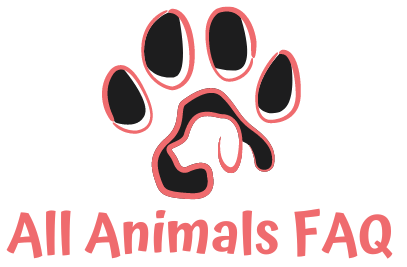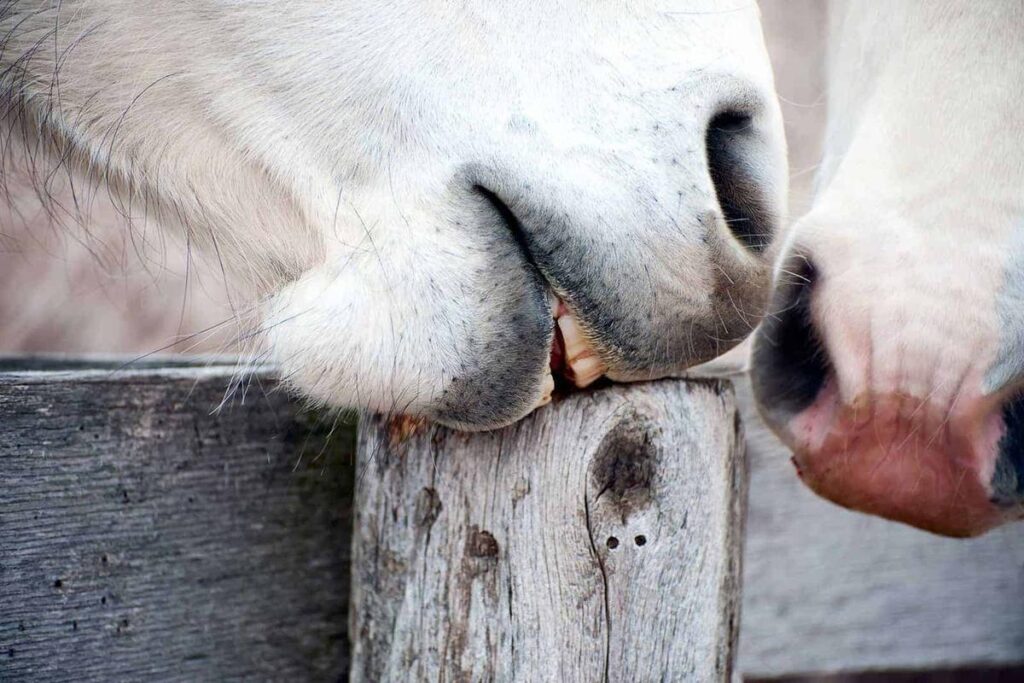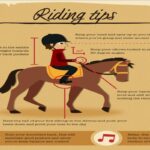They may develop out of boredom or they may be a coping mechanism for stress. Wood chewing in horses may also develop subsequent to a nutritional
deficiency in the diet. Over time, this behavior can have negative effects on the horse, including weight loss, gut issues or oral injuries .
What Are Horses Lacking If They Chew Wood?
First, rule out adietary deficiency. Horses will typically crave what is missing in their diet. Many horses chew on wood if their diet is lacking fiber. Lush pasture, for example, contains large amounts of soluble carbohydrates but may not offer enough fiber (nonsoluble carbohydrates) to meet ahorse’s daily needs.
How To Stop Horses From Chewing On Wood?
Solutions to Wood ChewingProvide quality grazing when possible. As mentioned, the wood chewing habit may be exacerbated by boredom. … Install chew guards. … Use ahot wire for wood fencing. … Make the wood taste unpleasant. … Try an anti-chew supplement. … Feed hay often in winter. … Fence off trees. … Provide entertainment.
Do Horses With Ulcers Chew Wood?
Colic – some horses who develop the habit of chewing wood are at greater risk of health concerns like colic. Ulcers – there’s debate as to whether behaviours like wood-chewing, windsucking, and crib-biting are asymptom or one of the causes of gastric ulcers; either way, wood-chewing is linked to ulcers in horses.
What Type Of Wood Is Bad For Horses?
Type of material Softwood wood shavings you can use for your horses include pine, Douglas fir, and spruce. You should avoid using wood shavings from tree species like black walnut, red maple, and cypress. Black walnut may trigger laminitis in horses.
What Do Horses Hate To Eat The Most?
To give you some guidance, we have listed below some foods you shouldn’t feed to your horses:Garlic and onions. Starting with acontroversial topic…. … Chocolate. Just like dogs and cats, you shouldn’t give chocolate to your horses, too. … Potatoes. … Tomatoes. … Meat. … Bread. … Avocado. … Dairy products.
How Do I Stop Chewing Wood?
Provide plenty of chew toys: Make sure your dog has plenty of toys that are safe and appropriate to chew on, such as rubber toys or bones. Exercise your dog regularly: Regular exercise can help reduce your dog’s anxiety and boredom, which are common reasons for wood chewing.
What Are The First Signs Of Ulcers In Horses?
Si gn so fu lc er si na du lt ho rs es ca nb ev ag ue an dm ay in cl ud e : Ac ut eo rr ec ur re nt co li c , pa rt ic ul ar ly af te re at in g . Lo ss of bo dy co nd it io n . Pe rf or ma nc ei ss ue s . Ch an ge si na tt it ud e . Fr eq ue nt ly in gd ow n .
Does Grass Help Ulcers In Horses?
There are plenty of things we can do to help combat ulcers: Allow horses as much time at grass as possible, with the company they need. Avoid starchy or sweetened food, sticking with the best quality forages.
What Can I Paint On Wood To Stop Horses From Chewing?
Derivan AntiCrib, anti-cribbing paint is an environmentally preferable product and, of course, horse and human friendly!
How Do You Protect Wood From Horse Chewing?
Some of the things people try (like old motor oil) are toxic; don’t use them as chemical chewing deterrents. Use aspray or liquid that is approved for horse areas. Abetter, safer way to protect wood fences is to cover the posts, poles or boards with small-mesh chicken wire.
Can Horses Digest Wood?
Although they cannot digest wood, it is not uncommon for wild horses to browse or chew on tree bark or branches. In fact, feces of feral horses has been found to contain traces of bark from different trees.
Why Does My Horse Keep Chewing?
It is assumed that horses try to relieve stress by chewing empty and gnashing their teeth. And horses suffering from peptic ulcers are often under stress. On the one hand usually as atrigger or co-trigger for stomach ulcers and on the other hand due to the pain caused.
Why Is My Horse Chewing Bark?
Many horses who chew bark do it to satisfy aneed for forage. Try giving your tree-eater free-choice access to hay to see if the behavior stops. Bored horses may also turn to tree chewing to pass the time. Providing more forage may help but it might be even better to add acompanion horse.
What Are The Symptoms Of Pica In Horses?
Pica is the desire to eat unusual substances that possess little or no nutritional value, such as dirt, wood, hair or faeces. Horses with pica can lick or mouth foreign substances, and in some cases ingest the materials.
What Bedding Is Toxic To Horses?
Black walnut shavings
Which Wood Shavings Should Be Avoided In Horses And What Can They Cause?
Never use products made from black walnut due to the risk of toxicity and laminitis in horses. Other toxic woods include oak, yellow poplar, and red maple. These materials can make horses sick when ingested. Some horses may also have allergies to cedar shavings.
What Can I Put On Wood To Stop Chewing?
This is an easy way to keep your pup away from wood and other objects you don’t want them to chew. One way to make aDIY spray is to combine one cup of white vinegar and one cup of apple cider vinegar in aspray bottle.
How Do I Get My Horse To Stop Chewing His Bit?
Adjusting the fit of your headstall can stop your horse from playing or chomping on the bit, says bitmaker Daryl Davis. When fitting aheadstall and bit on your horse, it comes down to personal preference, says bitmaker Daryl Davis.
What Tastes Do Horses Hate?
Although all horses are individuals and have their own preferences, in general they prefer sweet and salty flavours, and dislike bitter or sour tastes.
What Is Horses Worst Enemy?
Mountain lions are natural predators of wild horses and burros. These apex predators balance ecosystems and could help to regulate wild horse populations. But between hunting tags and government kill programs aimed at protecting livestock, thousands of mountain lions are killed on public lands each year.
What Is A Horse Biggest Enemy?
Humans are predator animals. Horses are prey animals. The horse’s natural enemies are predator animals: mountain lions, wolves, and yes, humans! Predators kill prey animals and eat them.
What Smell Do Horses Hate?
* The smell of predator urine causes afright response in horses and this persists even if the horse has never met such apredator. * Strong and unfamiliar smells like eucalyptus oil can cause asimilar reaction.
How Do You Fix Chewed Wood?
For already chewed up furniture legs, asimply DIY can fix the gnaw marks. Sand the rough edges and wipe away the debris. Deeper marks may need wood filler. Dab matching stain or paint.
What Animal Would Chew On Wood?
There are quite afew animals that will chew on wood at night-squirrels, raccoons, rats, etc. Some are just sharpening teeth and others are eating the wood. These marks look like teeth sharpening. Termites would leave holes not what you are seeing.
What Is A Home Remedy For Anti Chew?
StepsMix one part apple cider vinegar to five parts water in aspray bottle.Test on asmall, hidden area to ensure it doesn’t damage the material.Apply the mixture to the furniture your dog chews.Reapply as needed.Avoid spraying directly on your dog.
Do Worms Cause Ulcers In Horses?
Small Stomach Worm (Trichostrongylus) These worms produce alongterm, bloody inflammation of the stomach (catarrhal gastritis), which may result in weight loss. The affected area may be rather small and irregular, or it may grow to involve much of the stomach and cause ulcers.
What Are Five Major Symptoms Of A Horse That Is Not Feeling Well?
Signs of Sickness – How to read your horse’s behaviorWritten by Sue Stuska, Ed. … This article originally appeared in Eclectic Horseman Issue No.10.Apart from his buddies. … Bad breath from the mouth or nostrils may be due to an infected tooth or asinus infection. … Bowel changes. … Cold extremities. … Cranky with other horses.
Can Horse Ulcers Heal On Their Own?
Most ulcers in the equine stomach occur at the interface between the glandular and non-glandular portions of the stomach. Ulcers in the stomach can heal on their own, over time, but factors like stress and metabolic status can inhibit healing ability.



